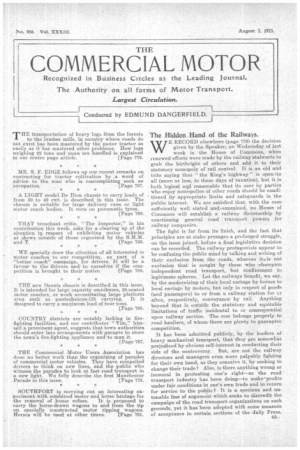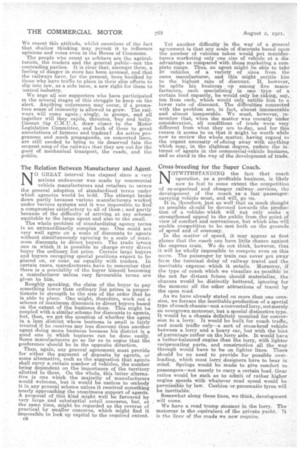The Hidden .Hand of the Railways.
Page 1

Page 2

If you've noticed an error in this article please click here to report it so we can fix it.
WE RECORD elsewhere (page 770) the decision given by the Speaker, on Wednesday of last week in the House of Commons, when renewed efforts were made by the railway stalwarts to grab the birthright of others and add it to their statutory monopoly of rail control. It is an old and trite saying that "the King's highway" is open to all (more or less, in these days of taxation), but it is both logical awl reasonable that its user by parties who enjoy monopolies of other roads should be conditioned by appropriate limits and safeguards in the public interest. We are satisfied that, with the case sufficiently well stated and,3examined, no House of Commons will establish a railway dictatorship by sanctioning general road transport powers for railway companies.
The fight is far from its finish, and the fact that principles are at stake presages a prolonged struggle, on the issue joined, before a final legislative decision can be recorded. The railway protagonists appear to be confusing the public mind by talking and writing of their exclusion from the roads, whereas it4,:is not exclusion that is sought by those who .champion independent road transport, but confinement to legitimate spheres. Let the railways benefit, we say, by the modernizing of their local cartage by horses to local cartage by motors, but only in respect of goods (and passengers) to or from a railway station for cr after, respectively, conveyance by rail. Anything beyond that is outside thestatutory and equitable limitations of traffic incidental to or consequential upon railway service. The rest belongs properly to road hauliers, of whom there are plenty to guarantee competition. It has been admitted publicly, by the leaders of heavy mechanical transport, that they are somewhat prejudiced by obvious self-interest in conducting their side of the controversy. But, are not the railway directors and managers even more palpably fighting for their own hand, as they conceive it, by seeking to change their trade? Also, is there anything wrong or immoral in protesting one's right—as the road transport industry has been doing—to makeprofits under fair conditions in one's own trade and in return for service to the public I It is a. specious and untenable line of argument which seeks to discredit the campaign of the road transport organizations on such grounds, yet it has-been adopted with some measure of acceptance in certain sections of the daily Press.
We resent this attitude, whilst conscious of the fact that shallow thinking may permit it to influence opinions and votes even in the House of Commons.
The people who count as arbiters are the agriculturists, the traders and the general public—not the contending parties. It is clear that, amongst them, a feeling of danger in store has been aroused, and that the railways have, for the present, been !baulked by those who have traffic to place in their slim efforts to slip into law, as a side issue, a new right for them to :tontrel industry.
We urge all our supporters who have participated in the several stages of this struggle to keep on the alert. Anything unforeseen may occur, if a premature sense of immunity is allowed to grow. The railways will come again; singly, in groups, and all together will they cajole, threaten, buy and bully. Cannot the C.M.U.A. draw closer to the Motor Legislation Committee, and both of them to great associations of farmers and traders ? An active programme and much propaganda, on concerted lines, are still needed to bring to its deserved fate the serpent song 'of the railways that they are out for the good of mechanical transport, the roads, and the public.
The Relation Between Manufacturer and Agent.
NO GREAT interval has elapsed since a very serious endeavour was • made by commercial vehicle manufacturere and retailers to secure the general adoption of standardized terms under which agencies would be held. The attempt broke down partly because various manufacturers worked, under various systems and it was impossible to find. a compromise satisfactory to all of them ; and partly because of the difficulty of arriving at any scheme equitable to the large agent and also to the small.
The whole problem of standardizing agency terms is an extraordinarily complex one. One could not very well agree on a scale of discounts to agents without simultaneously agreeing to a scale of maxiilium discounts to direct buyers. The trade is* not one in which it is possible to charge every direct buyer the ordinary list price. Certain large buyers and buyers occupying special positions expect to be placed on, or near, an equality with traders. In certain cases, manufacturers have to remember that there is a possibility of the buyer himself becoming a manufacturer unless very favourable terms are given to him.
Roughly speaking, the claim of the buyer to pay something lower than ordinary list prices is proportionate in strength to the size of the order that he is able to place. One might, therefore, work out a scheme of maximum discounts to direct buyers based on the extent of the business done. This might be coupled with a similar scheme for discounts to agents, but, then, we get the question of whether the agent in a lean district where business is small is fairly treated if he receives any less discount than another agent doing more business because his district is a good one in which business can be done easily. Some manufacturers go so far as to argue that the preference 'should be in the opposite direction. Then, again, any general agreement must provide for either the payment of deposits by agents, or some alternative, such as the suggestion that agents shall carry a certain number of vehicles, the number being dependent on the importance of the territory allotted to them. On the whole, this latter alternative is one which the majority of manufacturers would welcome, but it would be useless to embody it in any general scheme unless it received something nearly approaching the unanimous support of agents. A proposal of this kind might well be favoured by very large. and substantial retail concerns, but, at the same time, might be regarded as the reverse of practical by smaller concerns, which might find it impossible to lock up capital to the required extent. e6
Yet another difficulty in the way of a general agreement is that any scale of discounts based upon the number of vehicles taken would put manufacturers marketing only one size of vehicle at a disadvantage as compared with those marketing a complete range. Thus, an agent might lie able to take 50 vehicles of a variety of sizes from the same manufacturer, and this might entitle him to the highest rate of discount. If, however, he splits his business up among five manufacturers, each specializing in one, type of a certain load capacity, he would only be taking, say,. ten from each, which would only entitle him to a lower rate ,of discount. The difficulties connected with the problem are, in fact, almost innumerable and almost insuperable. We musts however, remember that, when the matter was recently under consideration, all conditions of trade were very different from what they are to-day, and for this reason it seems to us that it might be worth while now to review the whole matter, having regard to the urgent necessity of ,doing away with anything which may, in the slightest degree, reduce the interest of agents in the commercial-vehicle business, and so stand in the way of the development of trade.
Cross-breeding for the Super Coach. NOTWITHSTANDING the fact that coach operation, as a profitable business, is likely now to feel to some extent the competition of re-organized and cheaper railway services, the development' of the coach as a fast passengercarrying vehicle must, and will, go on. It is, therefore, just as well that as much thought as possible should be devoted towards the production of a vehicle, which will not only make a strengthened appeal to the public from the point of view of comfort and convenience, but which also will enable competition to be met both on the grounds of speed and of economy.
In the matter of speed, it may appear at first glance that the coach can have little chance against the express train. We do not think, however, that it will be wholly impossible to compete even on thin score. The passenger by train can never get away frau" the terminal delay of railway, travel and the inevitable expense which it entails. Moreover, if the type of coach which we visualize as possible in the not far distant future should materialize, the chances would be distinctly bettered, ignoring for the moment all the other attractions of travel by the open road.
As we have already stated on more than one occasion, we foresee the inevitable production of a special type of coach chassis—not a converted lorry, not merely an overgrown motorcar, but a special distinctive type. It would be a. chassis definitely unsuited for conversion to a lorry. It would be built for coach traffic, and coach traffic only—a sort of cross-bred vehicle between a lorry and a heavy car, but with the bias of parentage rather on the lorry side. It would have a better-balanced engine than the lorry, with lighter reciprocating parts, and construction all the way through would have to be on lighter lines. There should be no need to provide for possible overloading, which most lorry designers have to bear in mind. Springs would be made to give comfort to passengers—not merely to carry a certain load.. Gear ratios would be such as to admit of rather higher engine speeds with whatever road speed would be permissible by law. Cushion or pneumatic tyres will be inevitable.
Somewhat along these lines, we think, development will come.
We have a road tramp steamer in the lorry. The motorcar is the equivalent of the private yacht. it is the liner o,f the roads we now require.


































